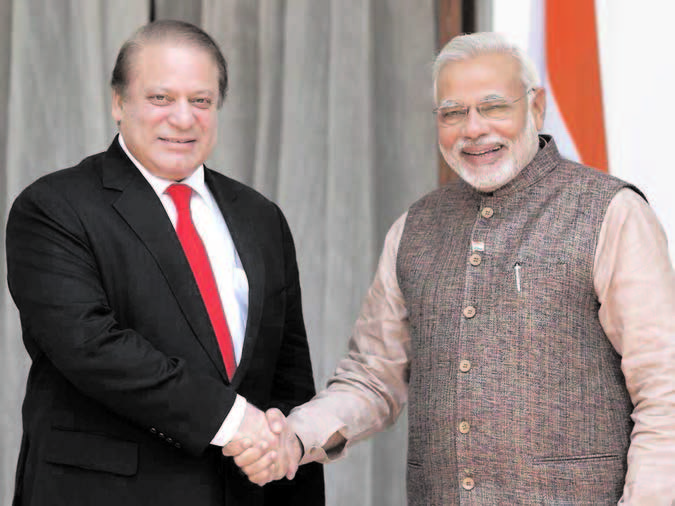
The most important country for Pakistan is India. How? It is an adversary with which we have very poor relations. We see each other as major threats. We cannot even sustain a dialogue. We have a far warmer, more trustworthy and strategic relationship with China. We have a less warm but equally important relationship with the United States.
So how is India so important? We have 80 per cent of our population in proximity with it. Indian forces are deployed against us. A dangerous neighbour is more important than a friendly one. If Pakistan is to develop it will need a peaceful neighbourhood. Our relations with India determine our input in Afghanistan.
To improve relations with India shall we have to accept its hegemony?Abandon our support for the people of Kashmir? Or downgrade our relations with China? Certainly not! But we shall need to implement rational and realistic India and Kashmir policies, while deepening our relations with China and improving mutual understanding with the US.
We need to transform Pakistan from a state of chaos and dysfunction to a modern and participatory development state governed by law and accountable and effective institutions. Policies and priorities that are inconsistent with this transformation will be self-defeating.
Those inclined towards confrontation with India, no matter what the social and diplomatic costs, are no friends of the people. A security state will ultimately minimise security and maximise risk. Only a functioning and inclusive state can maximise Pakistan’s options, raise its international standing and ensure its views are taken seriously in the main capitals of the world.
The Prime Minister talks about prioritising relations with India. But he is yet to develop credibility for his stance. Of course, we can blame India. It is not interested in any serious dialogue on Kashmir except on the basis of the territorial status quo. The US has no interest in pressing India for a compromise settlement with Pakistan. According to an American analyst, “The US sees Pakistan through an Af-Pak prism while it sees India through an Asia-Pacific prism. It does not see anything through an Indo-Pak prism”.
We were within touching distance of an interim agreement with India on Kashmir during the 2004-7 back-channel talks. The Mumbai bombings of 2008 intervened. Can and should these talks be revived? There are a variety of views. Some regard them as a national betrayal. Others consider them as the only way forward towards a just and mutually acceptable settlement.
We need to develop a realistic public consensus on what our strategies on Kashmir and policies towards India should be. They should be part of a national vision that includes space for initiatives towards India even when they seem premature and unlikely to be immediately reciprocated. Indian obduracy and Pakistani impatience will, however, need to be moderated for mutual trust to develop and longer-term and broad-spectrum progress to become feasible.
For this we shall need a Prime Minister prepared to take on powerful lobbies and vested interests, and to systematically and effectively communicate his vision and strategies to the people. Given that the current incumbent has surrendered much of his authority in order to stay in office, it is not clear whether he can be persuaded to implement his own preferred India policies.
If he shies away from making the effort he will inevitably lose credibility at home and abroad. His personal policy inclinations will be irrelevant. In that event, Narendra Modi may consider Ashraf Ghani’s example of preferring to deal with the real rather than the formal chief executive in Pakistan.
There are other issues on the India-Pakistan agenda that have their own history and dynamic. But they all unfold within the general state of the bilateral relationship. Accordingly, so-called “low hanging fruit” (relatively easier to resolve issues) have in recent years become more difficult. The bilateral agenda, moreover, needs to be expanded to include more regional and environmental issues such as an Afghanistan settlement, water and energy as well as security and development. Longer term perspectives have become indispensable.
Given the requisite commitment and leadership on both sides there is no India-Pakistan issue on which progress cannot be made. Under no circumstances can conflict, confrontation or tension with India benefit Pakistan, except in response to Indian threats and aggression. Nor can such policies ever politically benefit the Kashmiris. Moreover, it is our duty to ensure that our policies do not worsen their already terrible human rights situation.
Conversely, India cannot benefit from unilaterally provoking a nuclear-armed Pakistan beyond its tolerance. India is territorially the satisfied or status quo power. It may seek to undermine Pakistan’s ability to obstruct its regional and big power ambitions. It does not need war. Ironically, Indian aspirations have been facilitated by our own irrational and irresponsible policies.
China has a number of long-standing issues with its neighbours and with the US. It will not allow “red lines” to be crossed. Neither will it permit any issue to derail its comprehensive internal development and national transformation policies. These require a peaceful neighbourhood and a facilitating external environment. We need to take a page out of our great neighbour’s policy playbook.
But without a fundamental vision of human development and a national transformation strategy, the mere presentation of possible initiatives will not address our perennial problem. We will continue to fail the challenge of India-Pakistan relations in the 21st century and pay the higher price. Accordingly, India represents not just a policy challenge for us; it also represents a test of our sincerity towards our own people. We have, instead, preferred to posture and deny our people their right to a better life. Ta ba kay?





Be the first to comment